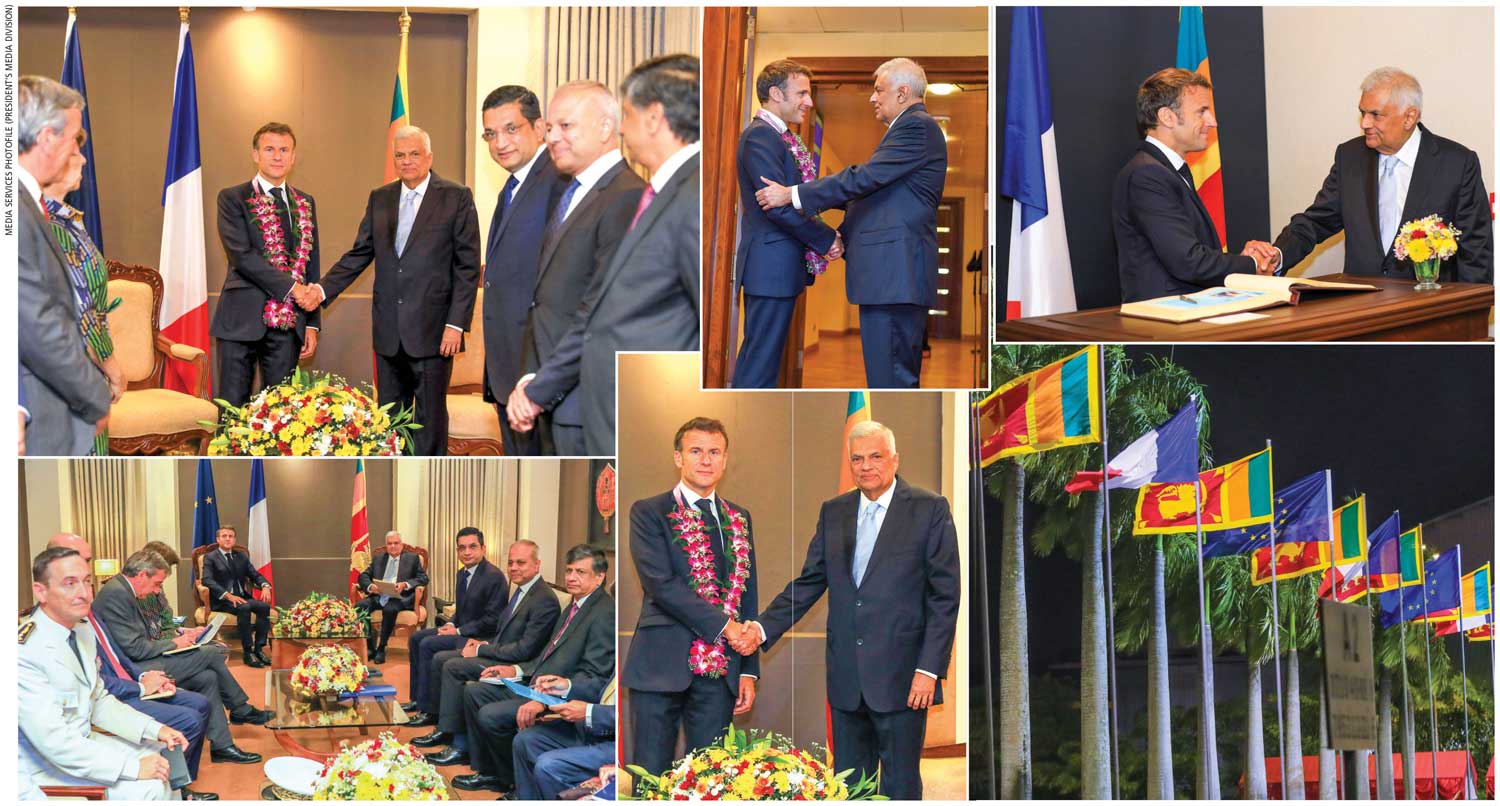VIEWPOINTS
RULING THE WAVES AND WAIVING THE RULES
Wijith DeChickera watches as neocolonial powers sail into our waters semaphoring the island nation’s growing geopolitical importance
 If Napoleon Bonaparte had not met his Waterloo – quite literally – in 1815 (the same year the Kingdom of Kandy fell to the inexorable British advance into the last citadel of a once sovereign isle), we Sri Lankans may have been feasting on escargot today, instead of sipping Earl Grey tea and yearning for another slice of toast with Marmite.
If Napoleon Bonaparte had not met his Waterloo – quite literally – in 1815 (the same year the Kingdom of Kandy fell to the inexorable British advance into the last citadel of a once sovereign isle), we Sri Lankans may have been feasting on escargot today, instead of sipping Earl Grey tea and yearning for another slice of toast with Marmite.
As it is however, the mettle of the ‘Iron Duke’ – George Wellesley, 1st Duke of Wellington – and the grim marching of Prussian Field Marshal Gebhard von Blücher, whose motto ‘Immer vorwaerts!’ (‘Always forward!’) meant there was only retreat to Flanders’ fields for the French putting paid to Napoleonic ambitions to expand his empire eastwards.
Of course, such aspirations had been despatched to Davy Jones’s locker – ever since the Battle of Trincomalee on 3 September 1782 when the British Navy defeated its French counterpart in a naval encounter of the Anglo-French War that sealed France’s fate as far as oriental expansionism was concerned.
In the end, it was Britannia – whose renowned naval strategist Lord Horatio Nelson had once before defeated Napoleon at the naval Battle of Trafalgar in 1805 – who came to ‘rule the waves’ and ‘waive the rules’ in the isle that many had coveted... yet, few possessed.
The Corsican adventurer, who had complained bitterly that “wherever wood floats, there you will find the British” (navy), was relegated to exile in a brace of islands (first, Elba where he was able to achieve not only fame but immortality; and finally, Saint Helena) – and neither ‘Trinco’ nor any other Sri Lankan maritime bastion was bothered by French frigates again.
But in the same spirit the erstwhile French Emperor once thought that “he who controls Trincomalee controls the Indian Ocean,” France’s contemporary foreign policy indicates ‘Frankish’ interests have embraced Sri Lanka in a tight Gallic hug with two kisses on the cheeks to boot of late.
And the landmark visit of French President Emmanuel Macron to Sri Lanka at the end of July – the first chief executive of that republic to do so after a maiden tour of France’s dominions in the Indian Ocean (Réunion) and the Pacific (French Polynesia and New Caledonia) – sends strong signals about the island nation’s growing significance in the ‘game of thrones’ known as geopolitics.
Not that Macron is a modern Napoleon as much as Russian leader Vladimir Putin is a latter-day Nikita Khrushchev. But France – seeking a ‘balancing’ and ‘mediatory’ stance to counter the hostile, aggressive and openly confrontational approaches of its ambivalent Anglo-Saxon allies – seems discontent to remain a NATO camp follower.
And in its strategic approach to imposing a French counterbalance in the Indo-Pacific, an Indian Ocean ‘pearl’ plays a key part.
For one – despite a long absence since colonial days, France is a stakeholder in Sri Lanka’s so-called ‘national question’: both supporting former president Chandrika Kumaratunga’s government with materiel in the 1990s, and critiquing the militaristic approach of subsequent regimes – including a 2009 visit to the isle by France’s then foreign minister Bernard Kouchner to safeguard the interests of civilians trapped between northern theatre of war combatants.
And for another… The UN Security Council permanent member plays a counterbalancing role at other United Nations forums; where China, which – being inimical to Western agency in Sri Lankan affairs, in addition to seeing our island as a cog in its Belt and Road Initiative (BRI) – regularly supports it at the United Nations Human Rights Council (UNHRC).
Last but not least, Macron’s interpretation of France’s role as an “inclusive and stabilising mediating power” in Indo-Pacific affairs, and the adoption of regional associations in working towards a new, more stable “multipolar global order” may see Sri Lanka and its Indian Ocean sister nations assume greater geopolitical significance in standoffs between the US and China, as well as Russia vis-à-vis Western allies.
That said, and unlike our ambivalent interlocutors such as the EU, UK and US – whose pendulums swing between granting trading privileges and cosponsoring resolutions on Sri Lanka at the UN – France is more open to the island’s ongoing trading, commercial and developmental pacts with China.
Back at home, matters of national importance may appear more mundane by comparison.
While minds that are easily distracted by the quotidian were engaged on the mispronunciation of a single word in the national anthem that has stumped many a schoolboy and schoolgirl, the National Water Supply and Drainage Board (NWSDB) announced a 50 per cent hike on tariffs overnight even as a songbird faced the prospect of becoming a jailbird – if the ‘ethno-nationalist brigade’ that takes umbrage at the drop of a water molecule has its way!
Which shows that when it comes to ruling the waves, bigots and those with politically motivated biases hold sway; and as for waiving the rules, not even the bureaucrats who would tax us heavily for our own version of Vichy water – or the ‘Labugama champagne’ we have on tap – are exempted from tariff revisions courtesy the IMF’s economic reform programme in action.
The landmark visit of French President Emmanuel Macron to Sri Lanka ... sends strong signals about the island nation’s growing significance in the ‘game of thrones’ known as geopolitics





